Do Canadians think Trump and Poilievre are similar? And if so, does it matter?
January 28, 2024
From January 18 to 23, 2024, Abacus Data conducted a national survey of 2,199 adults exploring several topics related to Canadian politics and current events as part of our regular national omnibus surveys.
As part of this survey, we asked Canadians several questions to try and understand if they see similiarities between Pierre Poilievre and Donald Trump. Initial reporting of these questions appeared in the Toronto Star on Saturday and comes after the Liberals and Prime MInister Trudeau attempt to tie Mr. Poilievre to Donald Trump.
If they had a vote in the US Presidential Election, how do Canadians think Poilievre and Trudeau would vote?
One way for us to gauge how Canadians perceive the similarities between Canadian political leaders and those in the United States (Trump and Biden) is to ask how Canadians think Mr. Trudeau and Mr. Poilievre would vote if they could in the 2024 US Presidential election.
68% of Canadians believe Justin Trudeau would vote for Biden while 13% think he would vote for Trump. 19% are unsure.
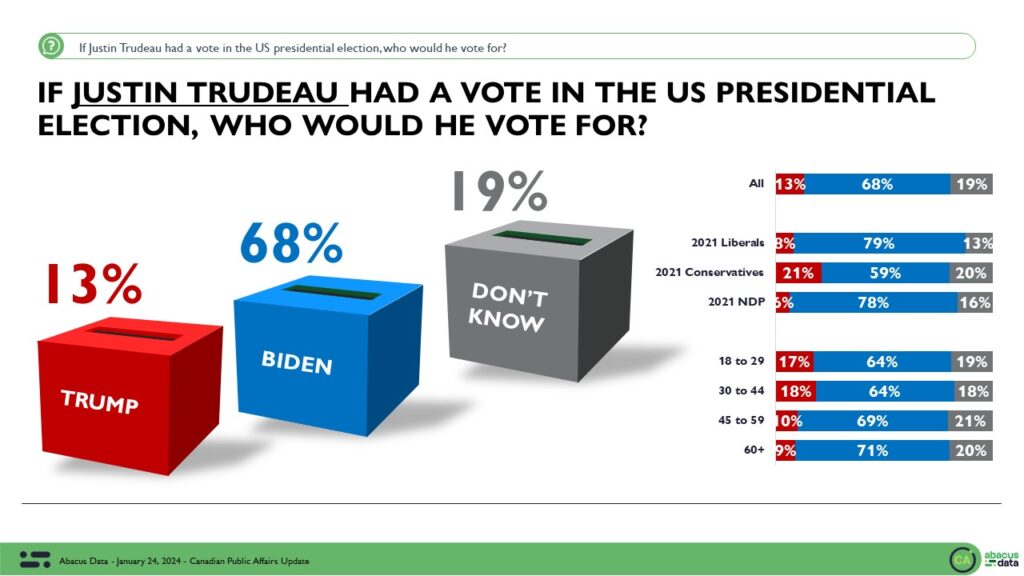
In contrast, 48% of Canadians think Poilievre would vote for Trump, 20% think he would vote for Biden, while 32% don’t know how he’d vote – 13-points higher than those unsure how Mr. Trudeau would vote.

At least a plurality of past Liberal, NDP and Conservative voters believe Mr. Poilievre would vote for Donald Trump.
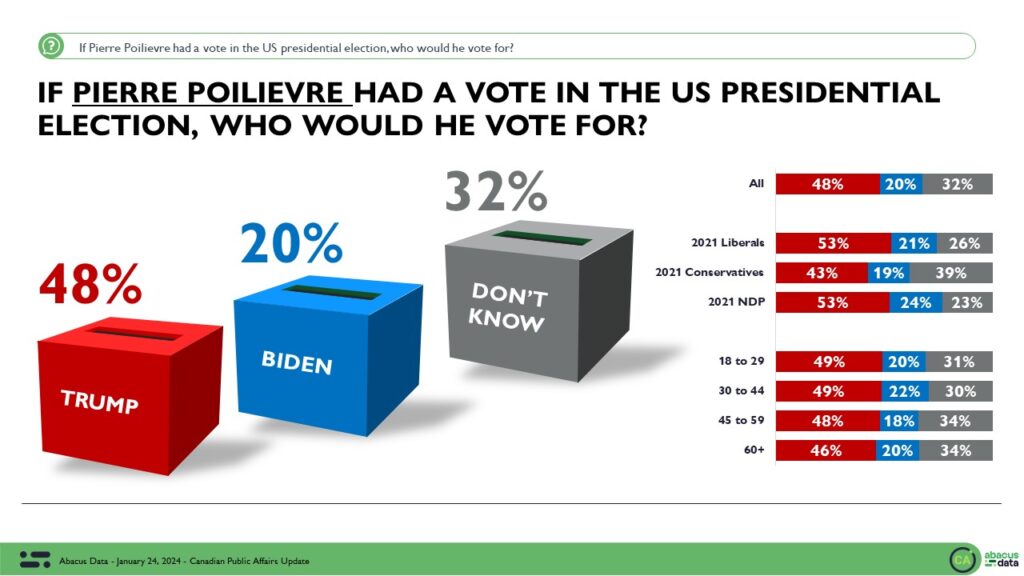
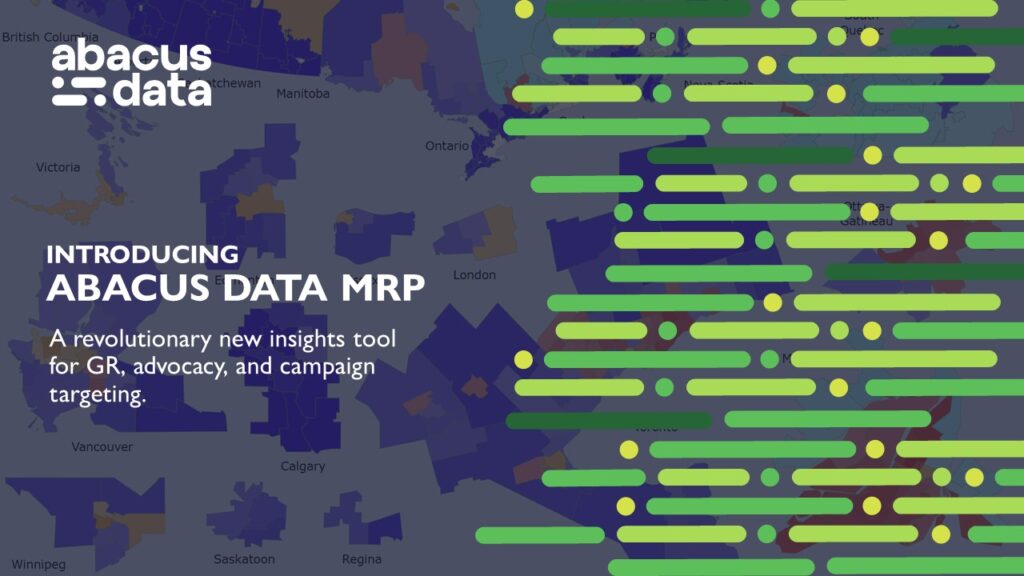
If they had a vote in the US Presidential Election, how do Canadians think Poilievre and Trudeau would vote?
One way for us to gauge how Canadians perceive the similarities between Canadian political leaders and those in the United States (Trump and Biden) is to ask how Canadians think Mr. Trudeau and Mr. Poilievre would vote if they could in the 2024 US Presidential election.
If Trump is US President, would it be better for Canada if Poilievre or Trudeau was Prime Minister?
By 15-points, Canadians are more likely to think Pierre Poilievre would be better to deal with Donald Trump as US President than Justin Trudeau. 44% picked Poilievre while 29% picked Trudeau. 28% were unsure.
Among current Conservative voters, 80% think Poilievre would be better, 4% pick Trudeau and 17% are unsure. Among Liberal supporters, 61% pick Trudeau, 1 in 5 pick Poilievre, and 22% are unsure. Among NDP supporters, 46% select Trudeau, 23% Poilievre, and 30% are unsure.
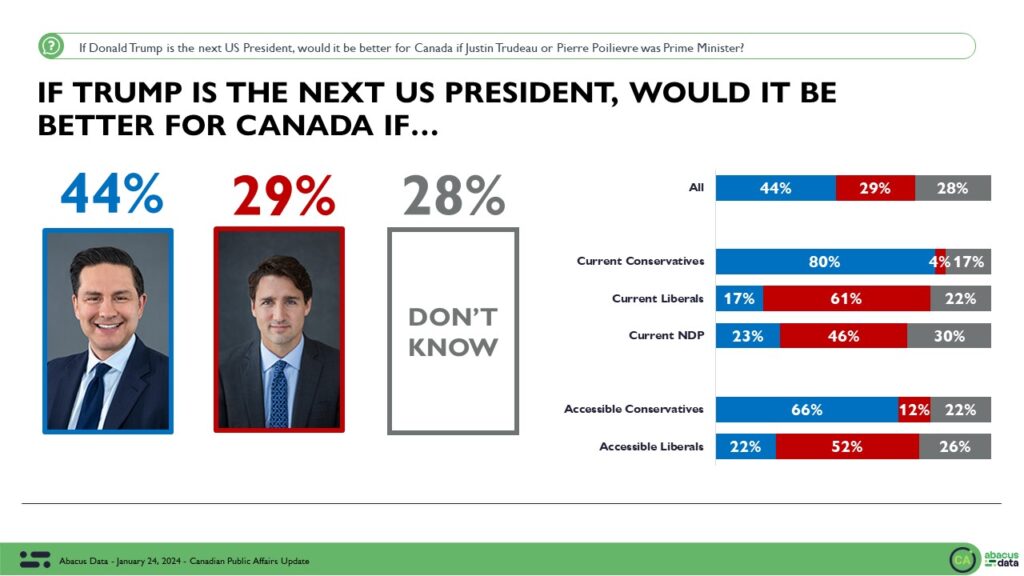
Stand up to Trump or Get Along to Play Along?
We also asked Canadians whether they thought the Canadian Prime Minister should stand up to Trump, even if it hurts Canada’s relationship with the US or should the Prime Minister find common ground where they can, even if it conflicts with Canadians values.
Overall, 2 in 3 want the Prime Minister to stand up to Trump (including 57% of Conservative supporters) while 36% would prefer the PM try to find common ground, even if it goes against Canadian values.
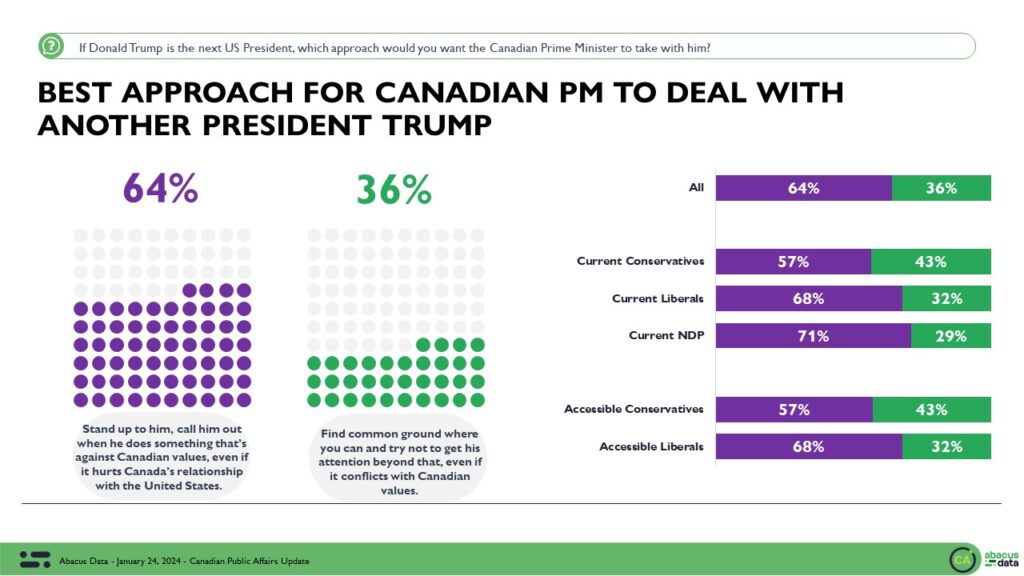
How similar are Poilievre and Trump?
More Canadians think Poilievre and Trump are similar than different, 4 in 10 Canadians believe they are similar, about 1 in 3 think they are different while the remaining 20% are unsure what to think.
When we expore specific attributes or areas, we find Canadians are more likely to think they are similar when it comes to their views on the environment and climate change (49%) and their stance on social issues (46%). 43% think they share similar worldviews and are similar in how they respect democracy. 41% feel they are similar when it comes to their communication and leadership styles.
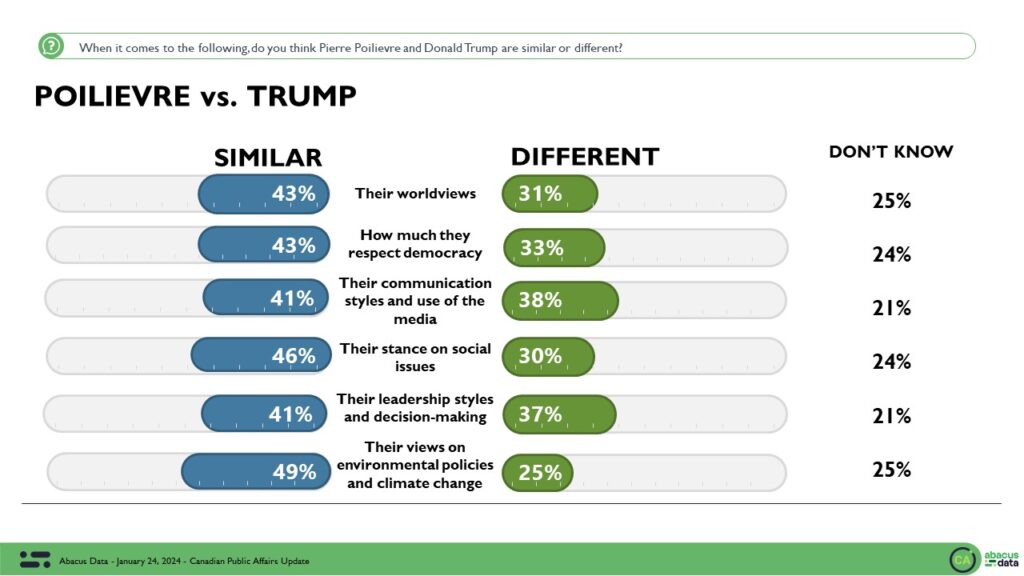
Among those open to voting Conservative (51% of the electorate), more think Poilievre and Trump are different, except for their views on the environment and climate change. And proportion who think they are different is greatest on how they communicate and their leadership styles.
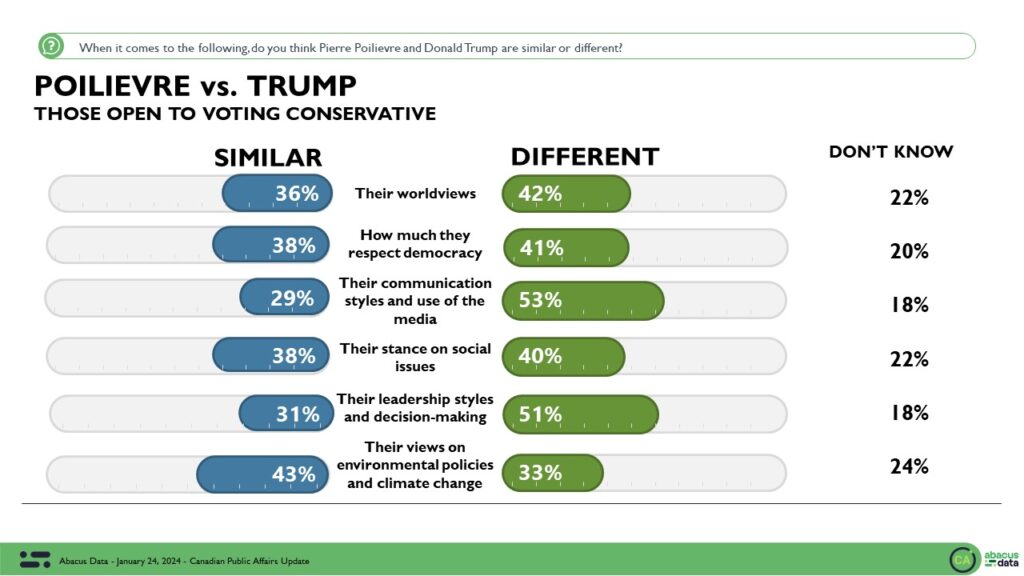
Among current Conservative supporters, 38% believe Trump and Poilievre are similar in most things, 49% see them as different while 13% are unsure.
Does thinking Poilievre is similar to Trump hurt politically?
There is evidence to suggest that being associated with Trump is correlated with vote intention, although making a causal link is more challenging.
In our survey, those who think Trump and Poilievre are different are more likely to be voting Conservative than those who think they are similar.
For example, among those who think the two are different, the Conservatives lead by 41-points over the Liberals – 57% to 16%, while among those who think they are similar, the Liberals and Conservatives are statistically tied (32% to 30%).
So it is possible that if more Canadians come to associate Mr. Poilievre with Mr. Trump, that could hurt Conservative vote share. It is also worth noting that for some Canadians, associations with Mr. Trump could also be a positive.
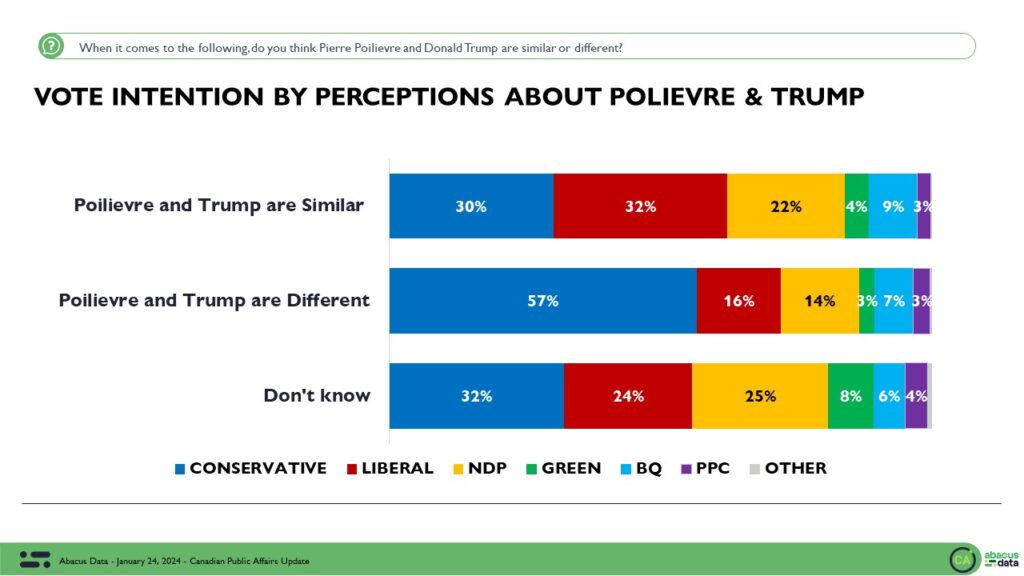
It is worth noting in a survey we did earlier in the month, Trump had the lowest rating when compared with Biden, Trudeau and Poilievre, but he was only marginally less liked than Trudeau.
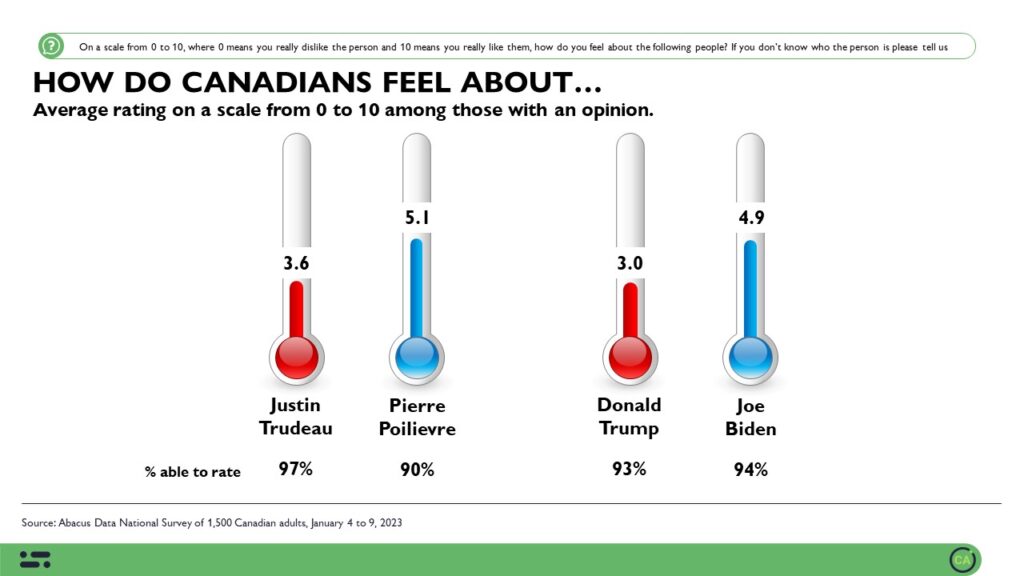
The Upshot
According to Abacus Data CEO David Coletto: “Associating Pierre Poilievre with Donald Trump may be an effective strategy at weakening Mr. Poilievre’s personal image and raising doubts about his suitability to be Prime Minister especially when 3 in 10 Canadians say they want a change in government but don’t feel comfortable with the alternatives to the Liberals.
Right now, about 4 in 10 Canadians think Poilievre is similar to Trump in some ways. Those who do are less likely to say they would vote Conservative. If that number rises, it could hurt the Conservatives but it may also be moot so long as people dislike Mr. Trudeau as much as they do and the desire for change is as strong as it is. We will track these numbers over the next year to see how perceptions evolve.”
Looking to conduct polling or market research in 2024? Have budget left to spend before the end of March? Send Yvonne an email to connect with the Abacus Data team today!
Methodology
The survey was conducted with 2,199 Canadian adults from January 18 to 23, 2024. A random sample of panelists were invited to complete the survey from a set of partner panels based on the Lucid exchange platform. These partners are typically double opt-in survey panels, blended to manage out potential skews in the data from a single source.
The margin of error for a comparable probability-based random sample of the same size is +/- 2.1%, 19 times out of 20.
The data were weighted according to census data to ensure that the sample matched Canada’s population according to age, gender, educational attainment, and region. Totals may not add up to 100 due to rounding.
This survey was paid for by Abacus Data Inc.
Abacus Data follows the CRIC Public Opinion Research Standards and Disclosure Requirements that can be found here: https://canadianresearchinsightscouncil.ca/standards/
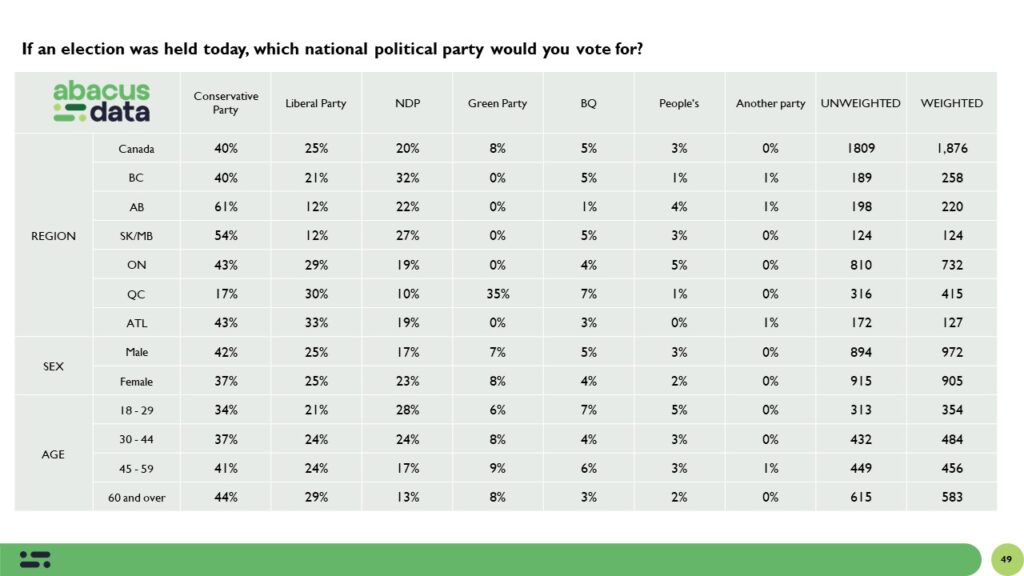
ABOUT ABACUS DATA
We are the only research and strategy firm that helps organizations respond to the disruptive risks and opportunities in a world where demographics and technology are changing more quickly than ever.
We are an innovative, fast-growing public opinion and marketing research consultancy. We use the latest technology, sound science, and deep experience to generate top-flight research-based advice to our clients. We offer global research capacity with a strong focus on customer service, attention to detail, and exceptional value.
We were one of the most accurate pollsters conducting research during the 2021 Canadian election following up on our outstanding record in 2019.
Contact us with any questions.
Find out more about how we can help your organization by downloading our corporate profile and service offering.




